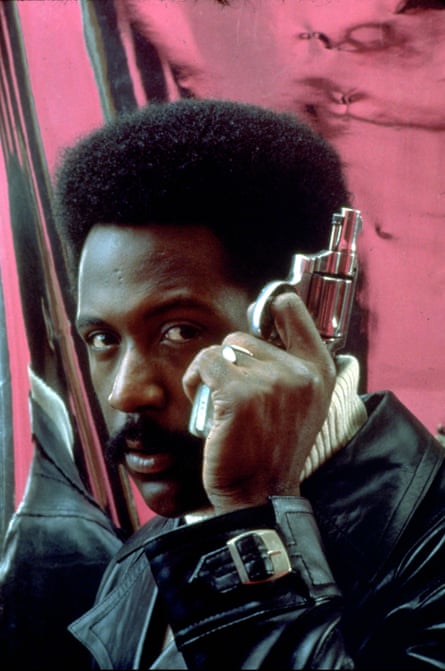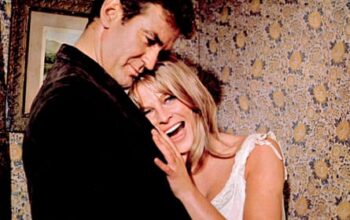I
In 1971, Richard Roundtree made a legendary entrance in film history. In his first movie role as Shaft, Roundtree emerges from the subway onto a wintry morning on New York’s 42nd street. He is styled with a groomed afro, mustache, and sideburns, dressed in a sleek suit, polo neck, and long leather coat. The funky theme song by Isaac Hayes starts playing with hi-hats and wah-wah guitar. Long-distance cameras capture his confident stride from above, while close cameras frame him heroically from below. He walks through the bustling streets with a sense of ownership, observing the surroundings, crossing the street without hesitation, and stopping traffic. He even gives the middle finger to yellow cabs and interacts with locals along the way. It’s as if Roundtree was already a fully-formed character upon his arrival.
It is challenging to fully understand the impact that Shaft had in 1971, especially from a modern perspective. The recent passing of Roundtree, at the age of 81, serves as a reminder of his significant contribution to the film. He was not only known as “the first Black action hero,” but he also brought a new form of Black masculinity to mainstream cinema. Previous Black actors, like Sidney Poitier, had portrayed characters that were respectable, principled, non-threatening, and lacking in sexuality (or portrayed as offensive stereotypes). However, Roundtree’s portrayal of Shaft was a heroic, sexual, and confidently proud Black character. While he fit the archetype of a tough private detective, he did not imitate white role models and did not hold white people in high regard – or anyone else for that matter. One memorable line is when he visits the office of a white detective, Lt Androzzi. “Have a seat, John,” he offers. To which Shaft responds, “I don’t like your chair.”

Although he was attractive and well-maintained, with a trendy apartment in Greenwich Village, the film does not shy away from depicting the societal issues of the time. The on-location filming serves as a time-capsule, showcasing the chaotic streets, run-down bars, and deteriorating buildings. When questioned about any difficulties he may face, Shaft responds, “Yeah, I have two: I was born Black and I was born into poverty.”
The film Shaft was released towards the end of the Black power movement, but it was not aggressive in nature. The director, Gordon Parks, was a well-known photojournalist and was familiar with the current social climate. He had previously taken photographs of members of the Black Panther party for Life magazine. They had even invited Parks to join their cause, but he believed that his camera was his most powerful weapon. As the main character, Shaft, navigates the turbulent and divided city of 1970s New York, he interacts with and mediates between various factions. He associates with Black militants, referred to as the “Lumumbas” in the film, but does not align himself with their beliefs. Instead, he is focused on preventing a potential race war as he moves between different neighborhoods and groups, including the Harlem underworld, Italian mafia, and white police force. He even has romantic relationships with both a Black woman and a white woman. His portrayal as a confident and successful hero, who also engages in interracial relationships, was groundbreaking for its time.
When Roundtree first met Gordon Parks to try out for the part, Parks showed him a fashion advertisement from a magazine and said, “We’re searching for someone who resembles this.” The model in the ad was actually Roundtree himself. A native New Yorker, he was discovered by a modeling agent and had been a member of the acclaimed Negro Ensemble Company for two years before being offered the role. Roundtree often acknowledged Parks for creating the iconic character of Shaft – Parks even sent him to his own tailor to get fitted – but Roundtree’s charm, athleticism, and effortless presence in front of the camera made the role a perfect fit.
He never let go of his role in Shaft. Roundtree became a true star thanks to Shaft, paving the way for a new era of cinema that centered around Black stories (similar to Parks, Roundtree disliked the term “Blaxploitation” and stated that his work was not exploitative). While he may not have found another role like it, he continued to work steadily for the next 50 years. He had roles in popular TV shows like Roots and films like Earthquake and Inchon, where he acted alongside legendary actors like Laurence Olivier, Jacqueline Bisset, and Toshirô Mifune. He also had smaller roles in various shows such as Magnum PI, The Fresh Prince of Bel-Air, and Desperate Housewives. However, he frequently returned to the role of Shaft, reprising it in two sequels in the 1970s (including the well-received Shaft’s Big Score! with Parks) and a short-lived TV series. In addition, he passed on the legacy of the Shaft character in two reboots in 2000 and 2019, playing the older generation of a family of Shaft’s, although even Samuel L Jackson was not as cool as Roundtree in his iconic leather trenchcoat.
Off-screen as well, Roundtree adopted something of a Shaft-like persona, flamboyantly dressed and bedecked in rings and necklaces. But beneath it all, he retained a certain humility and gratitude for his success. He seemed to have come to terms with being primarily associated with a single role. In one interview he said his father had told him to stop complaining about it, and that “a lot of people leave this earth not being known for anything.” Roundtree leaves this earth very well known for having permanently changed the culture.
Source: theguardian.com


